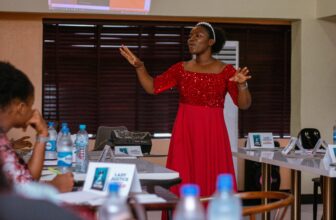
What if I told you that within each and every one of us lies a unique and powerful voice, waiting to be unleashed? A voice that has the potential to shape our destinies and create a lasting impact. How would you embrace and own your voice?”
In a world where conformity often takes center stage and individuality can be easily overshadowed, it becomes crucial for each and every one of us to recognize the power within our own voices. By embracing and expressing our unique perspectives, ideas, and experiences, we can not only foster personal growth but also contribute to the rich tapestry of human discourse.
To truly own our voices, we must first understand what it means to possess this remarkable ability. Our voice is not limited to the physical sound we produce; it encompasses the thoughts, emotions, and beliefs we choose to share with the world. It is the instrument through which we connect, influence, and inspire others. It is a catalyst for change and a tool for shaping our own destinies.
Ways individuals can own their voice:
– Self-reflection and self-awareness: According to a study by Harvard Business Review, self-awareness is one of the most important skills for leaders and professionals. The study found that self-aware leaders are more confident, creative, and collaborative. They also have higher levels of emotional intelligence, which helps them to understand and manage their own and others’ emotions.
– Embrace authenticity: Brené Brown, a renowned researcher and author, defines authenticity as “the daily practice of letting go of who we think we’re supposed to be and embracing who we are”. She argues that authenticity is essential for living a wholehearted life, which involves courage, compassion, and connection. She also suggests that authenticity can help us overcome shame, fear, and vulnerability.
– Overcome self-doubt and fear: Self-doubt and fear can stem from various sources, such as negative self-talk, past experiences, social comparisons, or unrealistic expectations. Some strategies to overcome self-doubt and fear include challenging negative thoughts, celebrating small wins, seeking support, and taking action. A famous quote by Eleanor Roosevelt says, “You gain strength, courage, and confidence by every experience in which you really stop to look fear in the face. You are able to say to yourself, ‘I lived through this horror. I can take the next thing that comes along.'”
– Practice effective communication: Effective communication is not only about speaking clearly and persuasively, but also about listening actively and empathetically. Effective communication can help us build trust, rapport, and understanding with others. It can also help us avoid misunderstandings, conflicts, and errors. Some skills that can improve our communication include using appropriate body language, asking open-ended questions, giving constructive feedback, and summarizing key points.
– Seek feedback and learn from others: Feedback is a vital source of learning and improvement, as it can help us identify our strengths, weaknesses, and areas for development. Feedback can also motivate us to achieve our goals and enhance our performance. However, feedback can also be challenging to receive and give, as it can trigger defensive or negative reactions. Therefore, it is important to seek feedback from credible and constructive sources, and to be open-minded and respectful when receiving and giving feedback.
– Set boundaries: Boundaries are the limits and rules that we set for ourselves and others in our personal and professional relationships. Boundaries can help us protect our physical, mental, and emotional well-being, as well as our values, identity, and autonomy. Boundaries can also help us communicate our expectations, preferences, and needs to others, and respect theirs in return. Some examples of boundaries include saying no to unwanted requests, asking for privacy, limiting screen time, or avoiding toxic people.
– Continuous learning and growth: Learning is a lifelong process that can enrich our lives in various ways. Learning can help us acquire new knowledge, skills, and abilities, as well as enhance our existing ones. Learning can also stimulate our curiosity, creativity, and critical thinking, as well as broaden our perspectives and worldview. Moreover, learning can boost our self-esteem, confidence, and happiness, as well as reduce stress and boredom. Some ways to foster continuous learning and growth include reading books, taking courses, attending events, joining communities, or pursuing hobbies.
– Embrace resilience: Resilience is the ability to cope with and bounce back from adversity, stress, and change. Resilience can help us overcome challenges, learn from failures, and grow from difficulties. Resilience can also help us maintain a positive outlook, a sense of purpose, and a hopeful attitude. Some factors that can enhance our resilience include having a strong support network, practicing self-care, cultivating gratitude, seeking meaning, and embracing change.
– Advocate for yourself and others: Advocacy is the act of speaking up for yourself or others, especially when facing injustice, discrimination, or oppression. Advocacy can help us assert our rights, interests, and needs, as well as defend those of others. Advocacy can also help us raise awareness, educate, and influence others on important issues or causes. Some steps to become an effective advocate include identifying your goals, researching your topic, building your network, crafting your message, and taking action.
– Practice, practice, practice: As the saying goes, “Practice makes perfect”. Practice is the repeated and deliberate application of a skill or activity, to improve or master it. Practice can help us enhance our competence, confidence, and performance. Practice can also help us develop habits, routines, and discipline. Some tips to optimize our practice include setting specific and realistic goals, seeking feedback, varying our methods, and reviewing our progress.
In conclusion, remember, that owning your voice is a journey that requires self-reflection, courage, and continuous growth. By implementing these practical steps, you can develop the confidence and authenticity to fully embrace and own your unique voice.
Your voice is an activating force. The sound of your voice transmits waves of energy—a unique frequency of “radiant energy that is transmitted by longitudinal pressure waves”—that creates a powerful energetic force.
Never let anyone subdue your voice. Go, see it, speak it, do it, and achieve it.







